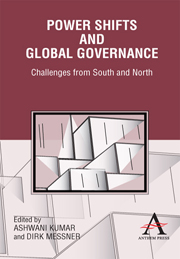Book contents
- Frontmatter
- Contents
- List of Contributors
- Foreword
- Power Shifts and Global Governance
- Part One Theoretical and Analytical Reflections on Global Governance
- Part Two Power Shifts, Regional Experiences and Global Challenges
- Part Three Case Studies in Global Governance
- 13 Unity in Diversity: South Coalitions as Governance Adaption Vehicles in Global Trade Governance
- 14 In the Foggy Middle East: Just Wars Remain the Name of the Game
- 15 Evaluation Capacity Development in the Arab Region: How Monitoring and Evaluation is Perceived and Applied?
- 16 UNEP Institutional Reform with its Impact on Developing Countries
- 17 The Heiligendamm Process and Emerging Powers: More of the Same or a Genuine Global Governance Innovation?
- Notes
16 - UNEP Institutional Reform with its Impact on Developing Countries
from Part Three - Case Studies in Global Governance
Published online by Cambridge University Press: 05 March 2012
- Frontmatter
- Contents
- List of Contributors
- Foreword
- Power Shifts and Global Governance
- Part One Theoretical and Analytical Reflections on Global Governance
- Part Two Power Shifts, Regional Experiences and Global Challenges
- Part Three Case Studies in Global Governance
- 13 Unity in Diversity: South Coalitions as Governance Adaption Vehicles in Global Trade Governance
- 14 In the Foggy Middle East: Just Wars Remain the Name of the Game
- 15 Evaluation Capacity Development in the Arab Region: How Monitoring and Evaluation is Perceived and Applied?
- 16 UNEP Institutional Reform with its Impact on Developing Countries
- 17 The Heiligendamm Process and Emerging Powers: More of the Same or a Genuine Global Governance Innovation?
- Notes
Summary
Introduction
This paper begins with two main assumptions. The first assumption is that the United Nations Environmental Programme (UNEP) is the key institution of global environmental governance. Developing countries and their individual concerns play a crucial role within the discussion surrounding the reform of the global environmental governance system. UNEP's current ability to perform its functions properly needs to be developed. The second assumption is that developing countries have to promote the process of development as well as environmental protection. Therefore, they need to participate better in global environmental governance.
Following from the main assumptions, several guiding questions are of crucial importance. First, is institutional reform of UNEP necessary and what are the main challenges? Second, what is the impact of UNEP institutional reform on developing countries? What are developing countries' political positions on UNEP and its possible reform? Third, what will UNEP look like in the future and how can developing countries better utilize and strengthen the institutional frameworks that currently exist?
To answer the research questions, a multiple methodology design was adopted. The first method involved documentary research such as: collecting, analyzing, and summarizing related documents and achievements. Three sets of interviews were conducted with scholars and organizations relating to UNEP reform including IISD (International Institute for Sustainable Development), IGSD (Institute for Governance & Sustainable Development), Department of Geography and Environment at King's College and others.
- Type
- Chapter
- Information
- Power Shifts and Global GovernanceChallenges from South and North, pp. 301 - 320Publisher: Anthem PressPrint publication year: 2010



